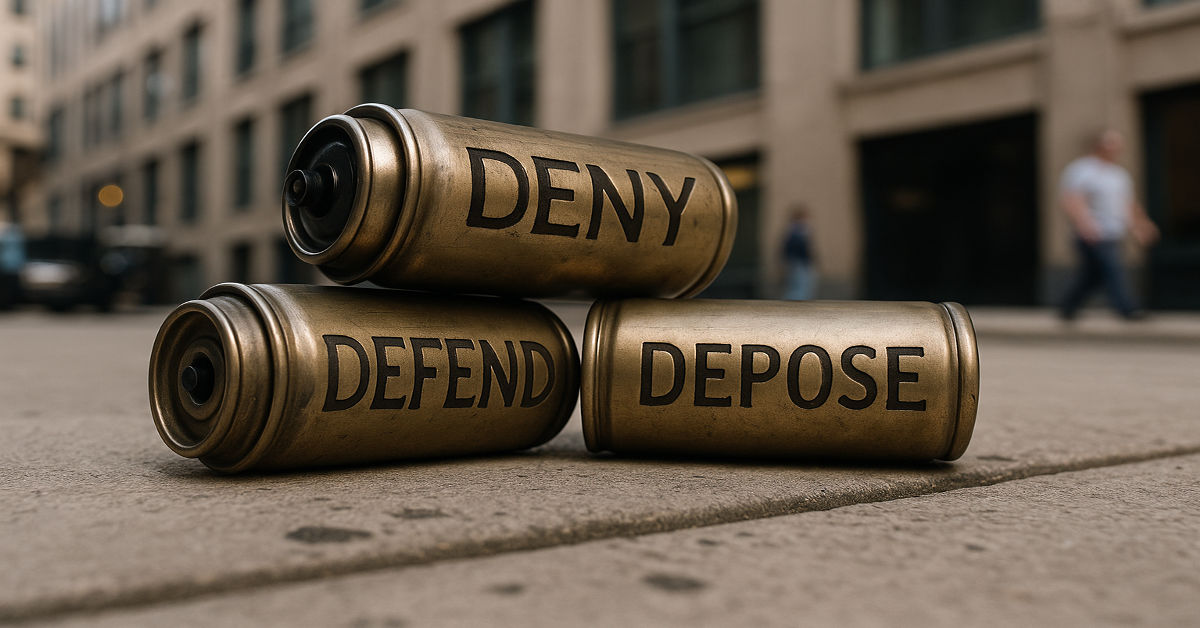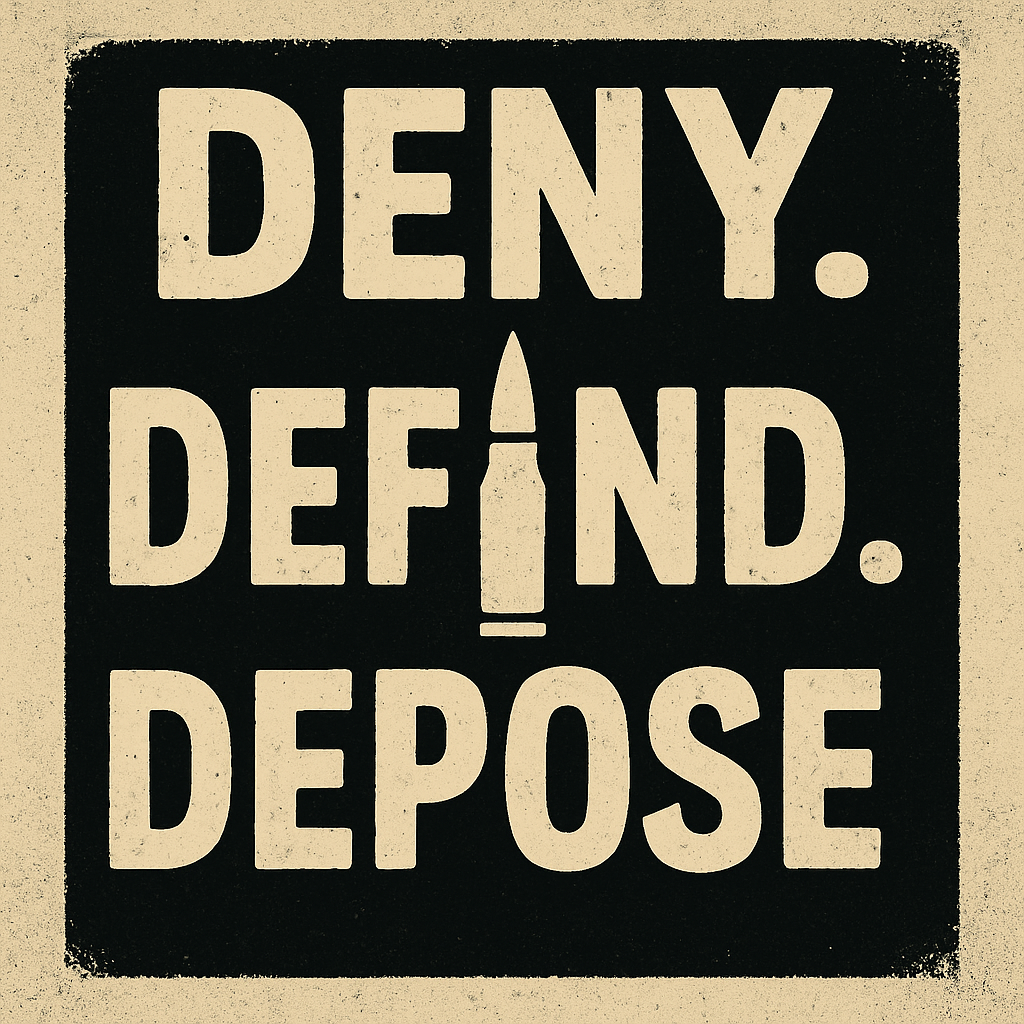Deny.
Defend.
Depose. And Then They Tried to Bury Us Both.
By Samara Dorn - Grand Junction, Colorado
AdministrativeErasure.org –Founder
— A Bureaucratic Hit Job Exposed
July 19th, 2025

View or Download the Original PDF Here
A manifesto, a murder, and a metadata smear:
What Luigi Mangione and a transgender Medicaid patient have in common will stop you cold.
They called it a manifesto.
Luigi Mangione etched three words into the brass casings of the bullets he used to allegedly assassinate UnitedHealthcare CEO Brian Thompson:
Deny. Depose. Delay.
Days later, when he was arrested, police recovered his handwritten statement, allegedly…He described the killing as a political act—targeted, deliberate, and directed at an industry he saw as profiting from patient suffering.
The public was stunned. Executives shook.
And I sat there—watching it unfold—just trying to refill a prescription that had been denied since November.
Two Cases. One System. One Doctrine.
Mangione is currently facing the death penalty.
I am fighting to be seen as human in a civil court.
He’s accused of murder.
I was flagged as a potential national security threat—for asking to refill my estrogen.
The difference between us is strategy.
But the machine that came for us? It’s the same.
What Happened to Luigi Mangione?
According to prosecutors, Luigi Mangione walked into a UnitedHealthcare investor event and shot CEO Brian Thompson at point blank range. Days later, when police apprehended him, they found a manifesto in his pocket. It was cold, analytical—and scathing.
He rejected the idea of mass violence. He chose one man.
One symbol.
One industry.
He wrote that Thompson “had it coming.”
He engraved the words Deny, Depose, Delay on shell casings.
He cited Michael Moore and systemic healthcare corruption.
And then—Aetna, a UnitedHealth subsidiary, leaked Mangione’s medical records to the prosecution, violating federal privacy protections in the middle of a death penalty case.
His body was on trial. So was his mind. His records. His privacy.
And UnitedHealth’s machine helped put them there.
What Happened to Me?
I’m not on trial for anything.
What I did do was ask for hormone medication after surgery.
What UnitedHealthcare did in response was:
Deny coverage
Defend appeals
Retaliate when I pushed back
And Now? Deposing— In Court
Just as I predicted on December 10th, 2024.
Thirty-five days after I last contacted a provider, they transmitted my PHI to federal law enforcement. Not because of an emergency. Not under subpoena. Not as part of any protected disclosure.
They escalated me to the Department of Homeland Security—FRAMING me as a national security concern, without legal process or clinical evidence.
And when that failed?
They took a second bite at the apple—forwarding my information to the Grand Junction Police Department.
This wasn’t about care. This was reputational damage control—by proxy.
The Parallel Is Not Coincidence—It’s Code
What Happened to Mangione vs. What Happened to Me
Both stories orbit the same corporate empire. Both were shaped by the same doctrine. But one ended in a courtroom—and the other nearly ended in silence.
Insurer Involved:
Luigi Mangione’s case involved Aetna, a subsidiary of UnitedHealth Group.
My case involves UnitedHealthcare of Colorado, also a subsidiary of UnitedHealth Group.
Nature of the Disclosure:
In Mangione’s situation, his medical records were leaked to prosecutors during a death penalty case—an extraordinary breach of privacy.
In mine, my protected health information (PHI) was disclosed to the Department of Homeland Security, and then rerouted to the Grand Junction Police Department—without a warrant, subpoena, or lawful exception.
Framing Phrase:
Mangione engraved the words “Deny. Depose. Delay.” on the shell casings he used in the shooting.
My lawsuit is built around the corporate phrase “Deny. Defend. Depose.”—the exact sequence UnitedHealthcare used against me.
Mechanism of Escalation:
In his case, the escalation came through reputation destruction in a capital trial—weaponizing his health history to secure a death sentence.
In mine, the escalation happened through metadata profiling and a false national security referral—a digital smear with real-world consequences.
End Result:
Mangione is now facing the death penalty.
I’ve been subjected to surveillance, emotional trauma, and administrative erasure—with no criminal charges, just retaliation masked as care.
This isn’t isolated.
It’s industrial.
Clarifying the Timeline
When Mangione’s bullet casings hit the news—etched with the words “Deny. Depose. Delay”—I was just trying to refill my medication.
It was already national news.
The public already knew what those words meant.
So did UnitedHealthcare.
And still—they did it anyway.
They denied my medication.
They delayed my care.
They defended the denials.
And when I fought back, they escalated me—first to the Department of Homeland Security.
And when that didn’t work, they rerouted my metadata and narrative to the Grand Junction Police Department.
So no—I didn’t invent the pattern.
I didn’t even name it first.
But I lived it.
And now I’m suing the doctrine that made both of us disposable.
This System Doesn’t Just Deny Care—It Eliminates People
It doesn’t always pull a trigger.
Sometimes, it redacts you from personhood.
Sometimes, it flags you in a spreadsheet.
Sometimes, it calls the police when it can’t shut you up.
Sometimes, it says “safety” and means “we’re done with you.”
Luigi Mangione’s name will live in court dockets for years.
Mine will live in public records, metadata trails, and (hopefully) civil case law.
But both of us?
We were treated like threats.
One of us responded with firepower.
The other responded with filings.
Why I’m Posting This Now
Because I referenced Mangione in my complaint before this story even broke nationally.
Because we are already part of the same case study, even if the courts don’t say so.
Because I know what it feels like to have your humanity algorithmically deleted.
And because if UnitedHealth is willing to bury one of us in court and the other in a body bag…
…they’re not going to stop with us.
If You're Reading This Inside the Machine
If you're reading this from behind a corporate firewall—hi.
Maybe you’re a paralegal.
Maybe you’re in PR.
Maybe you're a senior exec still pretending none of this is systemic.
Maybe you’re just trying to figure out if I’m dangerous enough to escalate again.
Let me save you the internal memo:
I am.
Dangerous to your doctrine, at least.
Look at what your system produced:
A man on trial for murder after your own affiliate leaked his medical records to the prosecution.
A trans woman escalated to the Department of Homeland Security for requesting a legally-covered medication.
A doctrine—Deny. Defend. Depose.—so baked into your policies that someone carved it into bullet casings, while another built a lawsuit around it.
You didn’t break us by accident.
You broke us by design.
You just didn’t expect we’d write it all down.
You’ve spent years gaslighting the public with taglines like “Optum Cares” and “United for Good,” while inside you’re running a patient offboarding algorithm with the ethics of a slot machine.
So go ahead. Screenshot this. Forward it to Legal. Flag it for “Executive Risk.”
I know how your email metadata works—I’ve seen your logs.
You taught us your doctrine:
Deny. Defend. Depose.
And now it’s being archived—in court, in headlines, and in history.
We are not going away.
We are not deleting posts.
And we’re not asking for permission anymore.
🔗 Read More: Systemic Denial After Surgery – A Survivor’s Report of Sabotage by UnitedHealthcare
A firsthand exposé of retaliatory denials, metadata weaponization, and life-threatening care obstruction following gender-affirming surgery.
🔗 Read More: The 35-Day ‘Myth’ of Imminent Threat
Disproving the emergency claim UnitedHealthcare used to justify disclosing PHI to law enforcement—35 days after last contact.
🔗 Read More: The Civil Rights Lineage of My Complaint Against UnitedHealthcare
Tracing the legal, ethical, and historical roots of a transgender patient’s challenge to surveillance-enabled discrimination.



